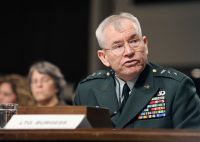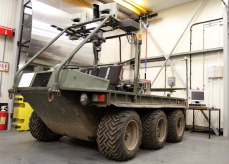WASHINGTON, Sept. 27, 2011 — Since it began operations Oct. 1, 1961, the Defense Intelligence Agency has changed along with the nature of national security threats worldwide to become a key component of the U.S. intelligence community.
 |
| Defense Intelligence Agency Director Army Lt. Gen. Ronald L. Burgess addresses the Senate Armed Services Committee, March 10, 2011. DIA photo Click to enlarge |
Today, according to agency officials, DIA is first in “all-source defense intelligence” � incorporating all sources of information — to prevent strategic surprise and to support warfighters, defense planners and policymakers. DIA manages and supplies all-source intelligence, and since the terrorist attacks in 2001, a growing number of DIA intelligence professionals have deployed globally alongside warfighters and interagency partners.
“We are more forward-deployed than ever, operating alongside our combat troops in harm’s way,” DIA Director Army Lt. Gen. Ronald L. Burgess Jr. said in a statement.
“DIA has an entire generation of intelligence professionals who know only wartime service. … They are very good at what they do, they’re committed to the mission, and they’re the best we’ve ever had,” he added.
The 9/11 attacks had a range of other effects on DIA and the rest of the intelligence community, including prompting the 2004 creation by Congress of the Office of the Director of National Intelligence, which assumed many functions of the positions of director and deputy director of central intelligence.
This and similar recommendations by the National Commission of the Terrorist Attacks upon the United States, known as the 9/11 Commission, increased the practice of embedding analysts and other professionals from various agencies in each other’s operations.
“When you go forward, you find CIA, [the National Security Agency], [the National Geospatial-Intelligence Agency], DIA — everybody working together right there on the floor in a tactical operations center or supporting a command,” DIA Deputy Director for Analysis Jeffrey N. Rapp told American Forces Press Service. “It’s really pretty remarkable the kinds of collaboration and integration that’s going on to enable operations.”
Such integration has helped prepare DIA for the future, Rapp said. “We may not be poised immediately for every possible problem we’re going to run into,” he added, “but one thing I’ve found is that we’re pretty adaptive.”
An example this year was Operation Unified Protector, he said.
“[Libya] wasn’t the top target on our radar screen, let’s face it,” Rapp said. “Yet within a matter of three weeks, we were implementing a complete change in national policy through an air campaign supporting combat operations.”
The 9/ll Commission’s recommendations also prompted intelligence agencies to improve information sharing within the federal government and among federal, state, and local authorities and with allies.
An enabling technology for such sharing is Analytic Space, or A‑Space, a project on a classified network on the Joint Worldwide Intelligence Communications System that was initiated by the ODNI Office of Analytic Transformation and Technology as a collaborative space for intelligence community analysts.
DIA was the executive agent for building the network’s first phase.
“It is a place where analysts can go, and at the highest classification levels, collaborate on ideas, discuss analytic issues and exchange information,” Rapp said.
A‑Space is cross-agency and cross-topic, he added. “Analysts can get together more easily than just through email contact or even telephone, and it’s more like what our younger folks are used to doing today.”
Another example is the Library of National Intelligence, created by the ODNI and the CIA as an authoritative intelligence community repository for all disseminated intelligence products, regardless of classification.
A key feature is a card catalog that has summary information for each report classified at the lowest possible level to allow analysts to discover nearly anything that has been published by the community regardless of document classification.
“All the production produced by the [intelligence community] every month goes to this Library of National Intelligence,” DIA Information Sharing Executive Roland P. Fabia told American Forces Press Service.
“There are probably 10 million holdings that analysts are accessing,” he added, “and it’s not only finished intelligence, it’s also raw intelligence.”
DIA’s first major challenge was in 1962, when the Soviet Union secretly placed nuclear-capable ballistic missiles in Cuba and DIA analysts played a key role in their discovery. Today, the agency’s work includes global terrorist movements, insurgencies and arms proliferation, along with the convergence of advanced technology, a complex and shifting international political environment, and increasing competition for global resources.
“If you look at where we came from and why DIA was created, it was an integrative agency to help pull military intelligence and military capabilities and defense analysis together for the department and for the nation,” Rapp said.
DIA, in collaboration with the services and the combatant commands, “helps focus and provide the best possible decision advantage to our senior-most policymakers,’ he added, “whether it’s the chairman [of the Joint Chiefs of Staff] and the secretary of defense, or the president. So, I think DIA is on a good path.”
“The nation has been understandably focused on current operations in Iraq, Afghanistan and elsewhere since 9/11, [but] the rest of the world has not stood still. Other nations have used this period as their windows of opportunity,” Burgess said.
“While supporting troops in harm’s way,” the director added, “DIA must also maintain a sharp focus to ensure that our efforts to combat transnational terrorists do not blind us to strategic surprise elsewhere.”
Source:
U.S. Department of Defense
Office of the Assistant Secretary of Defense (Public Affairs)

 von
von 